The Island of Sea Women Read online
Page 3
Mother gave some final advice: “The sea, it is said, is like a mother. The salt water, the pulse and surges of the current, the magnified beat of your heart, and the muffled sounds reverberating through the water together recall the womb. But we haenyeo must always think about making money . . . and surviving. Do you understand?” When we nodded, she went on. “This is your first day. Don’t be greedy. If you see an octopus, ignore it. A haenyeo must learn how to knock out an octopus underwater, or else it could use its arms against you. And stay away from abalone too!”
She didn’t have to explain more. It can take months before a beginning haenyeo is ready to risk prying an abalone from a rock. Left alone, the creature floats its shell off a rock, so that the sea’s nourishing waters can flow in and around it. When surprised—even if it’s only by the shift in current caused by a large fish swimming past—it will clamp itself to a rock so that the hard shell protects the creature inside from all predators. As a result, an abalone must be approached carefully and the tip of the bitchang inserted under the shell and flipped off the rock in one swift movement before the abalone can clamp down on the tool attached to a diver’s wrist, thereby anchoring her to the rock. Only years of experience can teach a woman how to get loose and still have enough time left over to reach the surface for air. I was in no hurry to attempt such a hazardous activity.
“Today you follow in my wake as I once followed in my mother’s wake,” Mother went on, “and as one day your daughters will follow in your wakes. You are baby-divers. Don’t reach beyond your abilities.”
With that blessing—and warning—Mi-ja took my hand and together we jumped feetfirst into the water. Instant, shocking cold. I hung on to my buoy, my legs kicking back and forth beneath me. Mi-ja and I looked into each other’s eyes. It was time for swallowing water breath. Together we took a breath, a breath, a breath, filling our lungs to capacity, expanding our chests. Then we went down. Light filtered turquoise and glittery close to the surface. Around us, others descended—with their heads directed to the ocean floor—through the canyon Mother had described, their feet pointed to the sky. Those women were quick and powerful, plunging a body length, another body length, deeper and deeper into darker blue water. Mi-ja and I struggled to achieve that straight angle. For me, the worst part was my goggles. The metal frames, responding to the water pressure even at this shallow depth, cut into my flesh. They also limited my peripheral vision, creating yet another danger and forcing me to be even more vigilant in this ghostly environment.
As baby-divers, Yu-ri, the Kangs, Mi-ja, and I could only go down about two body lengths, but I watched as my mother disappeared into the inky chasm of the canyon. I’d always heard she could reach twenty and sometimes more meters on a single breath, but already my lungs burned and my heart thumped in my ears. I kicked to go up, my lungs feeling like they were about to explode. As soon as I broke the surface, my sumbisori erupted and scattered on the air. It sounded like a deep sigh—aaah—and I realized it was just as Mother had always said it would be. My sumbisori was unique. And so was Mi-ja’s, which I learned when she split the water beside me. Wheeee. We grinned at each other, then swallowed more water breath and dove again. Nature told me what to do. The next time I surfaced, I had a sea urchin in my hand. My first catch! I put it in the net attached to my tewak, took another series of deep breaths, and went back down. I stayed within sight of Yu-ri, even if we resurfaced at different intervals. Every time I looked for Mi-ja, I found her not more than a meter away from one of the Kang sisters, who themselves stayed close together.
We repeated this pattern, pausing occasionally to rest on our buoys, until it was time to return to the boat. When I reached it, I easily hoisted my net—noticeably light compared to those of others—and carried it across the deck so that the woman behind me and her catch could board. Mother oversaw everything and everyone. One group of women secured their nets, tying the tops so nothing precious could escape, while Do-saeng and some others gathered around the brazier, sending warmth into their bones, drinking tea, and bragging about what they’d caught. Four stragglers still paddled toward the boat. I could sense Mother counting to make sure everyone was safe.
Yu-ri giggled at our shivering, telling us that eventually we’d get used to being cold all the time. “Four years ago, I was just like you, and now look at me,” she boasted.
It was a beautiful day, and everything had gone perfectly. I felt proud of myself. But now that the swells were rising, and the dipping and swaying of the boat was getting worse, all I wanted to do was go home. Not possible. Once our arms and legs were rosy with heat, we went back in the water. The five baby-divers stayed together—with one or another of us popping back up for air. Never before had I concentrated so hard—on my form, on the beating of my heart, on the pressure on my lungs, on looking. I can’t say that either Mi-ja or I found many sea creatures. Our main goal was not to embarrass ourselves as we tried to perfect the head-down dive position. We were pathetic. Acquiring that skill would take time.
When Mother sounded the call that the day was done, I was relieved. She looked in my direction, but I wasn’t sure if she saw me or not. I glimpsed Mi-ja and the Kangs swimming to the boat. They’d be the first three on board, so they’d get to listen as the other women breached the waters and let out their sumbisori. I was about to start paddling when Yu-ri said, “Wait. I saw something on my last dive. Let’s go get it.” She glanced around, taking in how far the grandmother-divers were from the boat. “We can do it before they get here. Come on!”
Mother had said I was supposed to stay with Yu-ri, but she’d also called for us to return to the boat. I made a split-second decision, took a few deeps breaths, and followed Yu-ri. We went to the same shelf where we’d been harvesting sea urchins. Yu-ri dragged herself along the craggy surface, pulled out her bitchang, jabbed it in a hole, and yanked out an octopus. It was huge! The arms must have been a meter long. Such a catch! I would get some credit for it too.
The octopus reached out and looped an arm around my wrist. I wrenched it loose. By the time I’d done that, some of its other limbs had grabbed on to Yu-ri. One had latched on to my thigh and was drawing me toward it, while another was slithering sucker over sucker up my other arm. I struggled to pull them off. The octopus’s bulbous head moved toward Yu-ri’s face, but she was so busy fighting the other arms that were reeling her closer into its grip that she didn’t notice. I wanted to scream for help, but I couldn’t. Not underwater.
Before another moment passed, Yu-ri’s face was covered. Instead of fighting or resisting, I swam closer, linked my arms around the octopus and Yu-ri, and kicked as hard as I could. As soon as we breached the surface, I yelled, “Help! Help! Help us!”
The octopus was strong. Yu-ri’s face was still covered. The creature was trying to pull us back under. I kicked and kicked. Suckers loosened from Yu-ri and came to me, sensing I was now the greater threat. They creeped along my arms and legs.
I heard splashing, then arms grabbed me. Knives flashed in the sun as suckers were pried from my skin, chunks of the octopus cut off and tossed through the air, discarded. Buoyed by the others, I lifted a leg so they could remove the suckers. When I caught a glimpse of my mother’s face, fierce in concentration, I knew I’d be safe. Women worked on Yu-ri too, but she didn’t seem to be helping them. Do-saeng pulled her arm back, her knife in her fist. If I were her, I would have used all my strength to stab the octopus’s head, but she couldn’t. Yu-ri was under there. Do-saeng went up under the octopus’s head, running the blade parallel to her daughter’s face. Despite the support from the women surrounding us, I could feel in my legs that I was the one keeping Yu-ri afloat even as the octopus continued to try to drag us under. The limpness of Yu-ri’s body in my arms told me something the others hadn’t yet realized. As strong as I wanted to be, I began to cry inside my goggles.
The women worked their way up to the thicker parts of the octopus’s appendages. That, combined with the repeated jabs and pokes
to the octopus’s head from the tip of Do-saeng’s knife, thoroughly weakened the creature. It was either dead or close to it, but like that of a lizard or a frog, its body still had impulses and strength.
Finally, I was free.
“Can you swim to the boat?” Mother asked.
“What about Yu-ri?”
“We’ll take care of her. Can you make it alone?”
I nodded, but now that the battle was over, whatever had caused me to fight so hard was dissipating fast. I made it about halfway to the boat before I had to flip onto my back to float and rest for a moment. Above me, clouds traveled quickly, pushed by the wind. A bird flew overhead. I closed my eyes, trying to draw on deeper strength. Waves lapped against my ears—submerging them one moment, then exposing them to the worried sounds of the women still with Yu-ri. I heard a splash, then a second, and a third. Arms once again supported me. I opened my eyes: Mi-ja and the Kang sisters. Together they helped me to the boat. Gu-ja, the strongest of us, heaved herself up and over the side. I placed my arms on the side of the boat and began to hoist myself up, but the ordeal had left me too weak. Mi-ja and Gu-sun each placed a hand under my bottom and pushed me up. I slipped onto the deck like a caught fish. I lay there panting, my limbs like rubber, my mind exhausted. I pulled my goggles from my eyes, and they clattered to the deck. The whole while, the three girls babbled nonstop.
“Your mother said we should stay in the boat—”
“She didn’t want us to help—”
“Baby-divers would only cause more problems—”
“In a rescue—”
I could barely take in what they said.
Other women began to arrive. I forced myself to sit up. Mi-ja and the Kangs went to the edge of the boat and reached down their arms. I joined them and helped grab Yu-ri. She felt heavy—a deadweight. We pulled her up and over, and we fell back to the deck. Yu-ri lay on top of me, not moving. The boat pitched, and she rolled to the side. Do-saeng came next, followed by my mother. They knelt next to Yu-ri. As the other haenyeo clambered aboard, Mother lowered her cheek to Yu-ri’s mouth and nostrils to feel if any breath escaped.
“She’s alive,” Mother said, sitting back on her heels. Do-saeng and some of the other haenyeo began to rub Yu-ri’s limbs, seeking to bring life back into them. Yu-ri didn’t respond. “We should try to empty her of water,” Mother suggested. Do-saeng edged out of the way. Mother pressed hard on Yu-ri’s chest, but nothing came out of her mouth. Unsuccessful, Mother said, “We must consider that the octopus saved her life by covering her face. Otherwise she would have inhaled water . . .”
The other women circled back in for their massaging.
Mother suddenly turned her attention to Mi-ja, the Kang sisters, and me. She regarded us, considering our actions. We were supposed to stay together. Mi-ja and the Kangs had, but they looked embarrassed. Mother didn’t have to say a word before the excuses began to sputter out.
“I saw her the last time I came up for air,” Gu-sun stammered.
“We were never out of Yu-ri’s sight,” Mi-ja choked out. “She watched over us all day.”
“She said she saw something big,” I mumbled.
“And the two of you went. I saw you go, even though I’d sounded the call.”
I couldn’t bear that Mother would think I’d been partly responsible for what had happened to Yu-ri, so I said, “We didn’t hear you.” I lowered my gaze and shivered—from shock, sadness, and now shame that I’d lied to my mother.
Mother shouted for everyone to take her place. We picked up our oars. The boat lurched as it began moving over and through the white-capped waves. Do-saeng remained by her daughter’s side, pleading with her to wake up. Yu-ri’s future mother-in-law took responsibility for leading our song. “My shoulders on this icy night shake along with the waves. This small woman’s mind shivers with the grief of a lifetime.” It was so mournful that soon we all had tears running down our cheeks.
Mother placed a blanket over Yu-ri and another over Do-saeng’s shoulders. Do-saeng wiped her face with a corner of the rough cloth. She spoke, but her words were carried away by the wind. First one woman then another stopped singing, each of us needing to hear Do-saeng. Yu-ri’s future mother-in-law kept our rowing rhythm going by beating the wooden handle of a diving tool on the edge of the boat.
“A greedy diver equals a dead diver,” Do-saeng lamented. We all knew the saying, but to hear it from a mother about her own daughter? That’s when I learned just how strong a mother must be. “This is a haenyeo’s worst sin,” she went on. “I want that octopus. I can sell it for a lot of money.”
“Many things exist under the sea that are stronger than we are,” Mother said.
She wrapped an arm around Do-saeng, who then expressed her worst fear. “What if she doesn’t wake up?”
“We have to hope she will.”
“But what if she remains like this—suspended between this world and the Afterworld?” Do-saeng asked, gently lifting her daughter’s head and placing it in her lap. “If she’s unable to dive or work in the fields, wouldn’t it be better to let her go?”
Mother pulled Do-saeng in closer. “You don’t mean that.”
“But—” Do-saeng didn’t finish her thought. Instead, she smoothed strings of wet hair away from her daughter’s face.
“None of us yet know what the goddesses have planned for Yu-ri,” Mother said. “She may wake up tomorrow her usual chatterbox self.”
* * *
Yu-ri didn’t wake up the next morning. Or the morning after that. Or the week after that. In desperation, Do-saeng sought help from Shaman Kim, our spiritual leader and guide, our divine wise one. Although the Japanese had outlawed Shamanism, she continued to perform funerals and rites for lost souls in secret. She was known to hold rituals for grandmothers when their eyesight began to fade, mothers whose sons were in the military, and women who had bad luck, such as three pigs dying in a row. She was our conduit between the human world and the spirit world. She had the ability to go into trances to speak to the dead or missing, and then transmit their messages to friends, family, and even enemies. Do-saeng hoped Shaman Kim would now reach Yu-ri’s soul and bring her mind back to her body and her family.
The ritual was held in Do-saeng’s home. Shaman Kim and her helpers wore colorful hanboks—traditional Korean gowns from the mainland—instead of Jeju’s usual drab trousers and jackets. Her assistants banged on drums and cymbals. Shaman Kim spun, her arms raised, calling out to the spirits to return the young haenyeo to her mother. Do-saeng openly wept. Jun-bu, Yu-ri’s brother, who was just beginning to develop peach fuzz on his cheeks, tried to hold in his emotions, but we all knew how much he loved his sister. Yu-ri’s future husband was pale with grief, and his parents did their best to comfort him. It was painful to see their sorrow. Still Yu-ri didn’t open her eyes.
That night, I told Mi-ja my secret—that Yu-ri had asked me to disobey my mother, and I had. “If I hadn’t agreed to go down one more time, Yu-ri wouldn’t be the way she is now.”
Mi-ja tried to comfort me. “It was Yu-ri’s duty to watch over you. Not the other way around.”
“I still feel responsible, though,” I admitted.
Mi-ja mulled that over for a few moments. Then she said, “We’ll never know why Yu-ri did what she did, but don’t tell anyone your secret. Think of the pain it will bring to her family.”
I also thought of the agony that would be added to my mother’s heart. Mi-ja was right. I had to keep this a secret.
* * *
After another week, Do-saeng asked Shaman Kim to try again. This time the ceremony was held in our bulteok—hidden from the prying eyes of the Japanese. In fact, no men attended. Not even Yu-ri’s brother. Do-saeng carried her daughter to the bulteok and laid her next to the fire pit. An altar had been set up against the curved stone wall. Offerings of food—so scarce—sat in dishes: a pyramid of oranges, bowls holding the five grains of Jeju, and a few jars of homemade alcohol. Candles flic
kered. Mother had offered to pay Jun-bu to write messages for Yu-ri on long paper ribbons. He did it for free. “For my sister,” he told me when I went to his family’s house to pick them up. Now the ends of the ribbons had been tucked into the wall’s rocky crevices, their tails flapping in the breeze that squeezed through the cracks.
Shaman Kim wore her most colorful silk hanbok. A sash the tint of maple leaves in spring tied closed the bright blue bodice. The main part of the fuchsia gown was so light that it wafted about her as she moved through the ceremony. Her headband was red, and her sleeves gleamed the hue of rapeseed flowers.
“Given the dominance on Jeju of volcanic cones, which are concave at the top like a woman’s private parts, it is only natural that on our island females call and males follow,” she began. “The goddess is always supreme, while the god is merely a consort or guardian. Above all these is the creator, the giant Goddess Seolmundae.”
“Grandmother Seolmundae watches over us all,” we chanted together.
“As a goddess, she flew over the seas, looking for a new home. She carried dirt in the folds of her skirt. She found this spot where the Yellow Sea meets the East China Sea and began to build herself a home. Finding it too flat, she used more of the dirt in her gown, building the mountain until it was high enough to reach the Milky Way. Soon her skirt became worn and tiny holes formed in the cloth. Soil leaked from it, building small hills, which is why we have so many oreum. In each one of these volcanic cones, another female deity lives. They are our sisters in spirit, and you can always go to them for help.”

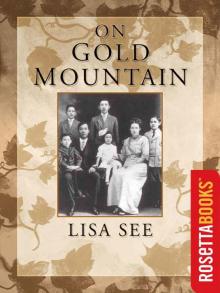 On Gold Mountain: The One-Hundred-Year Odyssey of My Chinese-American Family
On Gold Mountain: The One-Hundred-Year Odyssey of My Chinese-American Family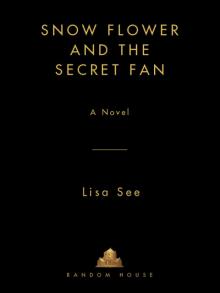 Snow Flower and the Secret Fan
Snow Flower and the Secret Fan Peony in Love
Peony in Love Flower Net
Flower Net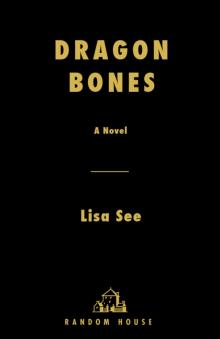 Dragon Bones
Dragon Bones Shanghai Girls
Shanghai Girls Dreams of Joy
Dreams of Joy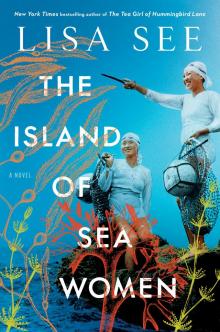 The Island of Sea Women
The Island of Sea Women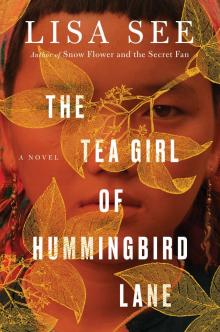 The Tea Girl of Hummingbird Lane
The Tea Girl of Hummingbird Lane China Dolls
China Dolls The Interior
The Interior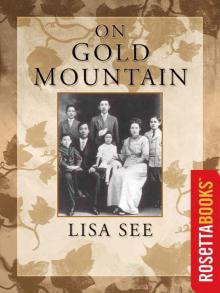 On Gold Mountain
On Gold Mountain